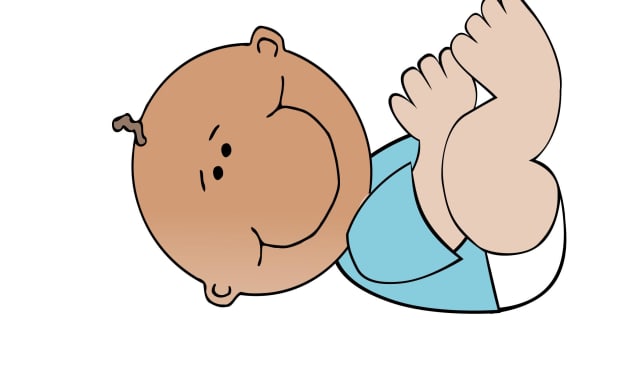Uncovering the Secrets of Your Baby's Milestones: How to Know if Your Baby is Growing Well
very parent wants to know if their baby is growing and developing normally. To help you understand and track your baby’s growth, we’ve prepared a comprehensive guide on baby milestones.

Introduction to Baby Milestones
A baby milestone is a skill or behavior that your baby develops at a certain age. They are generally divided into three categories: physical, social-emotional, and cognitive. Physical milestones include activities such as rolling over, sitting up, and crawling.
Social-emotional milestones refer to behaviors such as smiling, laughing, and responding to their name. Cognitive milestones involve being able to recognize shapes, colors, and objects by name.
It is important to note that all babies develop at different rates, so your baby may reach some milestones earlier or later than other babies. It is also important to remember that reaching milestones is only one part of the puzzle, and not all babies will reach every milestone.
Common Milestones and What They Mean
At different stages, your baby will reach different milestones. Here are some of the common milestones that your baby will reach in their first year of life:
At 2 months, your baby should be able to lift their head and hold it up for a few seconds. They should also be able to follow objects with their eyes and make cooing sounds.
At 4 months, your baby should be able to turn their head to the side when lying on their stomach. They should also be able to hold their head steady when being held upright, hold objects in their hands, and put objects in their mouth.
At 6 months, your baby should be able to sit up on their own and roll over. They should also be able to babble and respond to simple commands.
At 9 months, your baby should be able to crawl and pull themselves up to a standing position. They should also be able to say simple words like “mama” and “dada”.
At 12 months, your baby should be able to walk, point to objects, and understand simple instructions.
When to Expect Milestones
It is important to remember that all babies develop at different rates, so your baby may reach some milestones earlier or later than other babies. However, here are some general guidelines for when you should expect your baby to reach certain milestones:
At 2 months, your baby should be able to lift their head and hold it up for a few seconds.
At 4 months, your baby should be able to turn their head to the side when lying on their stomach.
At 6 months, your baby should be able to sit up on their own and roll over.
At 9 months, your baby should be able to crawl and pull themselves up to a standing position.
At 12 months, your baby should be able to walk, point to objects, and understand simple instructions.
Keep in mind that these are only general guidelines and that all babies are different.
How to Track Your Baby's Progress
To track your baby’s progress, you should keep a log of their milestones. This will help you keep track of their development and make sure they are on track. You can also use milestone charts to compare your baby’s progress to other babies of the same age.
It is important to remember that milestones are only one part of the puzzle. You should also be observing your baby’s overall behavior and development. Pay attention to how your baby interacts with you and other people and how they respond to different situations.

What to Do if Your Baby is Not Meeting Milestones
If your baby is not meeting milestones, it is important to speak to your pediatrician. Your pediatrician can help you determine if there is a medical issue or developmental delay that is causing the delay.
If there is a medical issue or delay, your pediatrician can refer you to a specialist or therapist who can help your baby reach their milestones. You can also talk to your pediatrician about special tools or activities that can help your baby reach their milestones.
Tips for Encouraging Progress
There are many things you can do to help your baby reach their milestones. Here are some tips for helping your baby reach and exceed their milestones:
Spend time talking and playing with your baby. Talk to them often and read to them.
Provide your baby with safe objects to explore. This will help them develop their hand-eye coordination and motor skills.
Give your baby plenty of opportunities to move and explore. Encourage them to crawl, walk, and climb.
Provide your baby with a variety of sensory experiences. Play music, show them different textures, and let them explore different objects.
Encourage your baby’s social development. Spend time talking to them, playing with them, and responding to their needs.
Signs of Developmental Delays
If you notice any of the following signs in your baby, it may be a sign of a developmental delay:
Not meeting milestones.
Poor eating habits.
Difficulty sleeping.
Difficulty communicating.
Difficulty understanding instructions.
Poor social skills.
Poor physical coordination.
If you notice any of these signs, it is important to speak to your pediatrician.
Resources for Parents
If you have any questions or concerns about your baby’s development, there are many resources available for parents. Here are some helpful resources:
The American Academy of Pediatrics (AAP) provides information on developmental milestones and provides resources for parents.
The Centers for Disease Control and Prevention (CDC) provides information on milestones and developmental delays.
The National Institute of Child Health and Human Development (NICHD) provides information on developmental milestones.
The National Dissemination Center for Children with Disabilities (NICHCY) provides information on developmental delays and resources for parents.
Questions to Ask Your Pediatrician
If you have any questions or concerns about your baby’s development, here are some questions you can ask your pediatrician:
Is my baby meeting their milestones?
Is there anything I can do to help my baby reach their milestones?
Are there any tests or therapies I should consider for my baby?
Are there any resources I can use to track my baby’s development?
What should I do if I think my baby may have a developmental delay?
Final Words
Tracking your baby’s milestones is an important part of monitoring their growth and development. By understanding the different milestones and when to expect them, you can make sure your baby is growing and developing normally. If you have any questions or concerns, it is important to speak to your pediatrician.
With this guide, you now have the tools you need to track your baby’s progress and ensure they are growing and developing normally. Remember to take the time to observe your baby and provide them with a supportive and nurturing environment.
https://www.lisodermbaby.com/2023/01/uncovering-secrets-of-your-babys.html





Comments
There are no comments for this story
Be the first to respond and start the conversation.